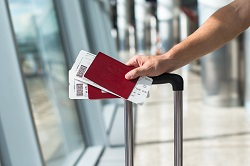Recommendations for a sustainable EU-own flight ticket tax
In previous decades, direct contributions from Member States’ national budgets have become the main source of funding for the EU budget. This has been widely criticised and it has been suggested that it should be replaced by a system whereby the EU is able to raise its resources through EU own taxes. The research team heading the Horizon 2020 FAIRTAX project has now linked this discussion over EU own resources with the central aim of the Europe 2020 strategy: to promote smart, inclusive and sustainable growth in the EU. The central message of the study by economists Alexander Krenek and Margit Schratzenstaller, from Austrian FAIRTAX partner WIFO, is that a carbon-based flight ticket tax presents itself, as measured in terms of sustainability criteria, as a suitable candidate for an EU-wide tax. The paper argues that the aviation sector is a small but fast growing emitter of carbon dioxide. The failed attempts of several EU Member States to introduce a flight ticket tax and the pressure on those Member States that are levying such a tax clearly demonstrates the limits of national aviation taxation. ‘Assigning any kind of taxes on flight tickets to the EU level would greatly reduce tax enforcement problems inherent to mobile tax bases and put a stop to harmful tax competition between EU Member States,’ commented Schratzenstaller. A double dividend, consisting of a reduction of CO2 emissions on the one hand and a boost for the economy on the other, is a likely scenario if additional tax revenues are spent in the right way, according to the researchers. ‘In the paper, we propose that all revenues from a European carbon-based ticket tax should be used to reduce Member State contributions to the EU,’ Schratzenstaller continued. ‘This would allow national governments to reduce taxes more harmful for growth and employment, in particular the high tax burden on labour. Considering the insufficient coverage of carbon emissions from air traffic by the EU Emission Trading System (ETS), alternative price-based instruments to curb carbon emissions from air traffic are required.’ The paper provides estimations on the expected revenue from implementing a carbon-based flight ticket tax at EU-level and revenue distribution across the EU Member States. In particular, the researchers propose that every passenger departing from an EU airport and every passenger arriving from outside the EU at an EU airport should be subjected to this new carbon tax which would be calculated for every individual flight route. The research paper uses a new and very exact data set. Depending on the country, it assigns approximately 75 % - 90 % of the internal and external EU routes flown in the year 2014 their C02 emissions per passenger, using the methodology of the International Civil Aviation Organisation (ICAO). Based on the demand, the tax revenues per passenger per route that could have been generated in 2014 by introducing a carbon-based flight ticket tax in the EU can be calculated exactly. The potential overall tax revenues from a carbon-based flight ticket for every individual EU Member State and the EU28 are estimated for three tax rates. The paper argues that they would have reached between EUR 3.9 billion and EUR 5.3 billion for a tax rate between EUR 25 and EUR 35 per tonne of carbon emissions. ‘Altogether, at the tax rates underlying our estimations, expected revenues from a flight ticket tax will be rather limited, so that they won't be able to replace a substantial share of current EU revenues. Nevertheless, a carbon-based European flight ticket tax may serve as an illustrative example to demonstrate the chances and challenges associated with international taxes in particular regarding their potential contribution to sustainable development,’ concluded co-atuhor Alexander Krenek. For more information please see: project website
Countries
Sweden



